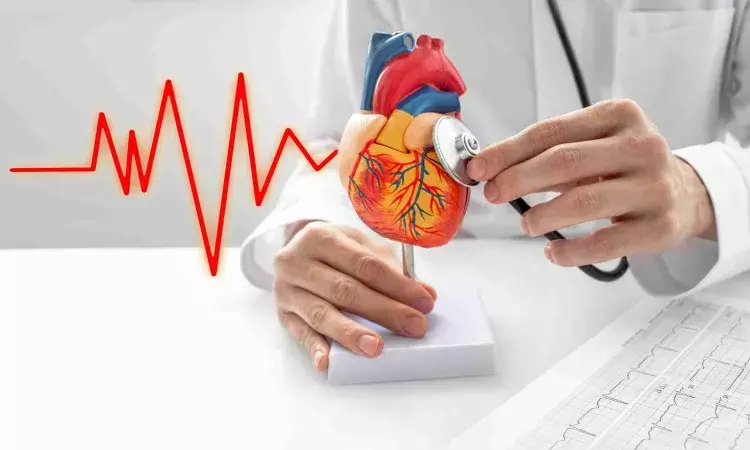- Home
- Medical news & Guidelines
- Anesthesiology
- Cardiology and CTVS
- Critical Care
- Dentistry
- Dermatology
- Diabetes and Endocrinology
- ENT
- Gastroenterology
- Medicine
- Nephrology
- Neurology
- Obstretics-Gynaecology
- Oncology
- Ophthalmology
- Orthopaedics
- Pediatrics-Neonatology
- Psychiatry
- Pulmonology
- Radiology
- Surgery
- Urology
- Laboratory Medicine
- Diet
- Nursing
- Paramedical
- Physiotherapy
- Health news
- Fact Check
- Bone Health Fact Check
- Brain Health Fact Check
- Cancer Related Fact Check
- Child Care Fact Check
- Dental and oral health fact check
- Diabetes and metabolic health fact check
- Diet and Nutrition Fact Check
- Eye and ENT Care Fact Check
- Fitness fact check
- Gut health fact check
- Heart health fact check
- Kidney health fact check
- Medical education fact check
- Men's health fact check
- Respiratory fact check
- Skin and hair care fact check
- Vaccine and Immunization fact check
- Women's health fact check
- AYUSH
- State News
- Andaman and Nicobar Islands
- Andhra Pradesh
- Arunachal Pradesh
- Assam
- Bihar
- Chandigarh
- Chattisgarh
- Dadra and Nagar Haveli
- Daman and Diu
- Delhi
- Goa
- Gujarat
- Haryana
- Himachal Pradesh
- Jammu & Kashmir
- Jharkhand
- Karnataka
- Kerala
- Ladakh
- Lakshadweep
- Madhya Pradesh
- Maharashtra
- Manipur
- Meghalaya
- Mizoram
- Nagaland
- Odisha
- Puducherry
- Punjab
- Rajasthan
- Sikkim
- Tamil Nadu
- Telangana
- Tripura
- Uttar Pradesh
- Uttrakhand
- West Bengal
- Medical Education
- Industry
Chronic high caffeine consumption may heighten risk for cardiovascular disease, finds new study

From coffee to tea, caffeinated beverages are an integral part of morning routines across the globe, but these popular drinks can be harmful when enjoyed in excess. According to a new study being presented at ACC Asia 2024 in Delhi, India, drinking over 400 mg of caffeine per day on most days of the week could increase the susceptibility of otherwise healthy individuals to cardiovascular disease.
“Regular caffeine consumption could disturb the parasympathetic system, leading to elevated blood pressure and heart rates,” said lead author Nency Kagathara, MBBS, Department of Internal Medicine, Zydus Medical College and Hospital, Dahod, India. “Our study sought to determine the effects of chronic caffeine consumption on heart health, specifically the recovery of heart rate and blood pressure.”
Chronic caffeine consumption was defined as the intake of any caffeinated drinks five days per week for more than one year. The study focused on tea, coffee and aerated beverages such as Coke, Pepsi, Redbull, Sting and Monster. The authors evaluated a randomized group of 92 normotensive and healthy individuals between the ages of 18 and 45 years. All participants had their blood pressure and pulse measured and underwent a three-minute step test. Blood pressure and heart rates were measured at one minute and five minutes after the test. The authors recorded information on each participant’s sociodemographic data and daily caffeine intake.
The results found that 19.6% of the participants consumed more than 400 mg of caffeine every day, which translates to about four cups of coffee, 10 cans of soda or two energy drinks. Chronic caffeine consumption at 400 mg daily was shown to significantly impact the autonomic nervous system, raising the heart rate and blood pressure over time.
Researchers said the highest daily caffeine intakes were observed in participants who were female, employed in business and management roles, and living in urban areas.
Those who consumed the highest amounts, chronic caffeine consumption of more than 600 mg of caffeine per day, had significantly elevated heart rates and blood pressure after five minutes of rest following the step test
“Due to its effect on the autonomic nervous system, regular caffeine consumption could put otherwise healthy individuals at risk of hypertension and other cardiovascular events,” said Kagathara. “Increasing awareness of these risks is vital to improve heart health for all.”
High blood pressure, also known as hypertension, is associated with an increased risk of coronary artery disease, heart failure, chronic kidney disease, and dementia. Hypertension weakens your heart over time and is a leading risk factor for heart disease. In addition to caffeine intake, there are several factors that could contribute to high blood pressure, such as alcohol consumption, smoking, age, family medical history, and salt consumption. Increasing physical activity, following a nutritious diet and other lifestyle changes could help lower blood pressure and reduce the risk of heart disease.
Dr Kamal Kant Kohli-MBBS, DTCD- a chest specialist with more than 30 years of practice and a flair for writing clinical articles, Dr Kamal Kant Kohli joined Medical Dialogues as a Chief Editor of Medical News. Besides writing articles, as an editor, he proofreads and verifies all the medical content published on Medical Dialogues including those coming from journals, studies,medical conferences,guidelines etc. Email: drkohli@medicaldialogues.in. Contact no. 011-43720751


